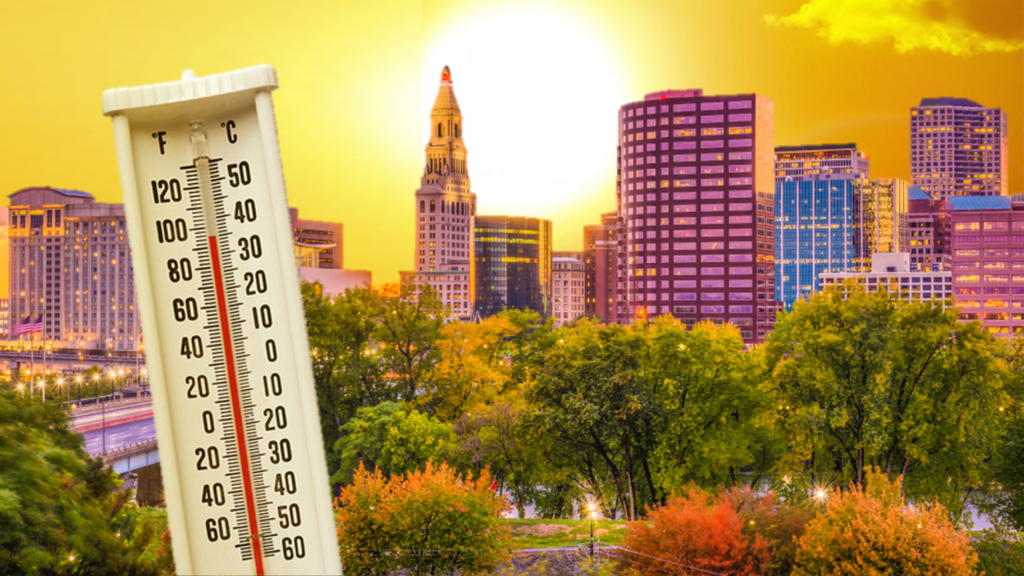Heatwave Incoming: What This Means For Your Central Air System

It’s that time of year once again, temperatures are rising and Connecticut is likely to feel the warmth of another summer heatwave. CT Residents are no strangers to end of July temperature increases. The hottest weather ever recorded in Connecticut was in July of 1995, where temperatures reached a scorching 106°F! What many people aren’t aware of is the affect hot weather has on their central air conditioning systems. Those hot days can make everyone feel a little sluggish, including your air conditioning system. On these hot days, your unit might require extra work to cool down your rooms. Heat, humidity, and airflow all play a significant part in how your air conditioner operates in your house. If you have wondered about the heat and its effects on your AC unit, take a few minutes to read on.
High Heat
Have you ever thought about how your air conditioner works in your home? An AC unit is basically a heat transfer system that consists of two heat exchangers. These exchangers work with the heat in two environments. First, the exchanger captures the heat from the air inside your house. Once it collects that air, it sends the warm air to the outdoor condensing unit. That exchange will also limit the amount of heat energy from the hot outside air. On those sweltering days, the air conditioning system will need to work extra hard to keep you cool.
In addition to that, the air conditioner has to remove warm air that may be leaking from other sources around your residence, such as the seams in doors and windows. All of this hot air must be removed with the warm outdoor air. As a result, the AC unit is now working to cool down all of these warm air sources.
Your air conditioner is based on the principle of equilibrium. The system can work better when both environments are set around the same temperature. However, when the outdoor heat is rising, it is harder for the indoor environment to become cooler than the outdoors. When there is a big difference in temperature, like hot and humid weather, the system will need to work harder for your home to remain comfortable.
In many cases, the air conditioner’s performance is based on the outdoor temperature. Your unit will find it easier to reject heat at 80 degrees than when it reaches 95 degrees. When your system has to work harder to keep you cool, you are putting more stress on the entire unit. Any added stress can lead to parts breaking down or malfunctioning in the future.
Humidity
You might think that heat is the only element that can cause harm to your air conditioning system. However, humidity also plays a significant role in your AC’s performance. On an excessively humid day, your air conditioner will need to work harder to get rid of that damp and clammy air. In most cases, the humidity and heat occur at the same time. Your system will have to work to exchange the warm air, but it must also manage the humidity levels in your house. If your air conditioner is not properly removing the humidity, you can usually sense it in your residence. You might even feel the physical effects, such as sweating, frizzy hair, or clammy skin.
Airflow in Your Home
Many people assume that only heat and humidity can affect the performance of their air conditioners. However, airflow is critical to the efficiency of your air conditioning system, too. You need proper circulation to move the air throughout your home. If the circulation is blocked or interrupted, your air conditioner will work harder to give you a cool and comfortable house. If your residence is still hot and humid, then you might want to make sure that the airflow is not compromised.
You can usually check the airflow by yourself. One of the most common problems is that the airflow is blocked from the outside. Shrubbery and plants near the condenser can block that critical flow of air. You will want to check that the landscaping is not near the outdoor condenser. If it is blocking the area, you will want to trim any shrubs, trees, or flowers near the outdoor unit. Many professionals recommend that you keep at least one foot of clearance around the entire system.
The location of the air conditioning unit is also essential. One popular place for a unit is under a deck. While the deck is open on the sides, it creates a large amount of hot air that can be captured and drawn back into the system. When that happens, the air conditioner will need to operate at a higher temperature. The hot temperatures will cause the refrigerant to build pressure as the compressor starts to run at a warmer temperature.
That poor airflow can cause elevated temperatures in the lubricating oil within the compressor. In turn, the oil may start to break down and seize the compressor. This oil works in the same way as the oil in your car. You will need to take care of the oil to prevent engine wear and tear. However, the air conditioner oil will never need to be changed. It is manufactured to last for the lifespan of your cooling system. For many units, the oil can run for about 15 to 25 years if you have a properly maintained system with adequate airflow.
If you think that your air conditioner has airflow issues, you can usually check it with a thermometer. You will want to choose a calm day to operate your AC unit. When you are an inch from the vent, you can check the temperature. You should get the same temperature reading from 20 feet away. If your air temperature is higher, then you could have an issue with recirculation. At Total Mechanical Systems, we can help you to determine the source of airflow issues in your Connecticut home.
Check Your Equipment
For the most part, you do not need to worry about wear and tear to your air conditioner in the hot weather. These systems are made to handle the heat. However, you need to keep up on the maintenance and make sure it is operating at its peak performance. You want to keep all components clean and fully functional. Dirty condensers can work harder in the hot weather, and that can lead to excessive wear and tear. The internal operating temperatures and pressures in those situations will start to exceed the normal operating standards. If your unit operates under those conditions for an extended period of time, it will begin to overheat. As this happens, the oil will become acidic as the compressor fails.
If you are looking to keep your air conditioner in excellent shape, you will want to maintain it. With the right maintenance, you will never have to worry about staying cool in hot and humid weather.





